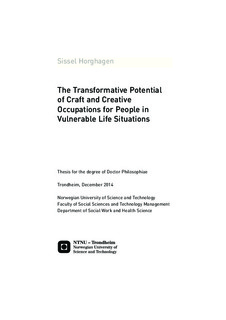| dc.contributor.author | Horghagen, Sissel | |
| dc.date.accessioned | 2015-03-05T14:55:30Z | |
| dc.date.available | 2015-03-05T14:55:30Z | |
| dc.date.issued | 2014 | |
| dc.identifier.issn | 1503-8181 | |
| dc.identifier.uri | http://hdl.handle.net/11250/278544 | |
| dc.description.abstract | Modern- day health challenges are not only physical, but often related to loneliness, poverty and alienation.
People in vulnerable situations can be at risk of becoming passive, being excluded, or taking up destructive
activities. This implies a requirement for more efforts from health and social workers in the field of health
promotion for people in vulnerable life situations. There is a need for both traditional and experimental
interventions to develop scientific knowledge useful for these challenges. The overall aim of this thesis is to
contribute to an understanding of how craft and creative activities, used by people in vulnerable life situations,
might enhance their participation in everyday occupations. This is explored from the subjective experiences of
pioneers, homeless people, asylum seekers, and people with mental health illness. Their engagement in crafts
and creative activities will be studied from an occupational science perspective, revealing these occupations and
their transformative potential for the involved participants.
The thesis includes four studies (Paper I-IV), which use a qualitative explorative methodological design. The
first study (Paper I) investigates the history of professional use of craft activities, and explores the reasoning of
six occupational therapist pioneers using craft activities as therapy in the 1950s. Based on a hypothesis of the
healing potential of creative occupations, three additional studies were designed. The first of these (Paper II)
explores engagements in a theatre-project for eleven asylum seekers who were living at asylum centres. A
theatre-performance was developed based upon the participants’ narratives. The next study (Paper III) explores
the narratives presented by homeless people in ethnodrama, and how they related this to meaning in their
everyday lives. The fourth study (Paper IV) explores the potential of engaging in crafts and creative activities at
a meeting- place for people with long-term mental illness. Data was gathered through guided conversations,
participant observations and ethnographic participation. Data analysis methods were textual analysis, interpretive
analytic method and paradigmatic analysis.
The results of Paper I present the therapists’ belief in the healing sources of occupation. Paper II presents how
participation in a theatre project led to liberation, collaboration and relationship for the participants. Paper III
shows how drama was used as a tool to liberate homeless people’s resources, and Paper IV presents how a
crafts- group at a meeting place enabled the participants to find strategies to make changes for the better.
Through these studies, connections can be drawn regarding past, contemporary and anticipated future
occupational perspectives. The overall results from Papers II and III reveal how some of the participants were
not afforded basic human rights, such as societal inclusion, and how this hindered their engagement in ordinary,
everyday occupations.
The thesis presents and discusses how participants’ engagement in craft and creative activities promoted
personal, social and environmental transformations. At a personal level their engagements catalyzed changes
including moving from victimised positions to being in charge of their own lives, brought new characters into
existence, and developed problem-solving strategies to manage problematic situations and to cope with everyday
occupations. Their participation in crafts and creative activities also led to social transforms, including the
transition from being invisible to become visible in their local environments, enabling peer support, and developing sense of meaning. Further the findings presented how transformation of knowledge and tolerance
between the participants and their local communities occurred from the engagement in these activities.
Through knowledge and experiences from the participants’ engagements in craft and creative activities, this
thesis contributes with knowledge about oppressive mechanisms for people in vulnerable life situations and how
the context of society affects people’s everyday occupations. Further the thesis exemplifies and contributes to
knowledge about the transformative potential of craft and creative occupations, and how participation in these
activities contributes to personal, social and environmental changes for people in vulnerable life situations. | nb_NO |
| dc.language.iso | eng | nb_NO |
| dc.publisher | NTNU | nb_NO |
| dc.relation.ispartofseries | Doctoral thesis at NTNU;2014:349 | |
| dc.relation.haspart | Paper 1:
Horghagen, Sissel; Josephsson, Staffan; Alsaker, Sissel.
The use of craft activities as an occupational therapy treatment modality in Norway during 1952-1960. Occupational Therapy International 2007 ;Volum 14.(1) s. 42-56
<a href="http://dx.doi.org/10.1002/oti.222" target="_blank"> http://dx.doi.org/10.1002/oti.222</a> | |
| dc.relation.haspart | Paper 2:
Horghagen, Sissel; Josephsson, Staffan.
Theatre as Liberation, Collaboration and Relationship for Asylum Seekers. Journal of Occupational Science 2010 ;Volum 17.(3) s. 168-176
Is not included due to copyright available at
<a href="http://dx.doi.org/10.1080/14427591.2010.9686691" target="_blank"> http://dx.doi.org/10.1080/14427591.2010.9686691</a> | |
| dc.relation.haspart | Paper 3:
Horghagen, Sissel.
The kingdom of the subjunctive: Theatre as meaning making of the self. Ergoterapeuten 2012 (2) s. 54-61 | |
| dc.relation.haspart | Paper 4:
Horghagen, Sissel; Fostvedt, Berit; Alsaker, Sissel.
Craft activities in groups at meeting places : supporting mental health users' everyday occupations. Scandinavian Journal of Occupational Therapy 2014 ;Volum 21.(2) s. 145-152 Is not included due to copyright available at
<a href="http://dx.doi.org/10.3109/11038128.2013.866691" target="_blank"> http://dx.doi.org/10.3109/11038128.2013.866691</a> | |
| dc.subject | vulnerable groups, theatre, crafts, occupational science, problematic situations | nb_NO |
| dc.title | The Transformative Potential of Craft and Creative Occupations for People in Vulnerable Life Situations | nb_NO |
| dc.type | Doctoral thesis | nb_NO |
| dc.subject.nsi | VDP::Social science: 200 | nb_NO |

